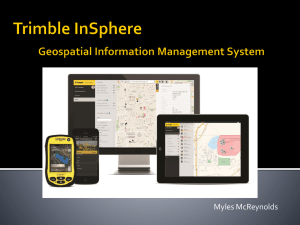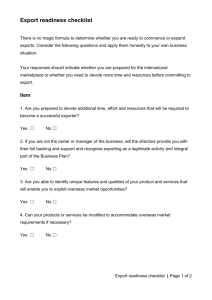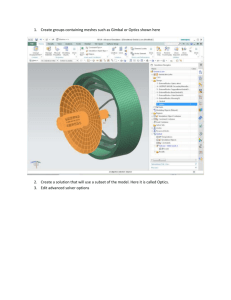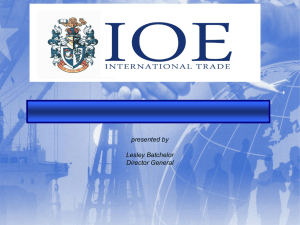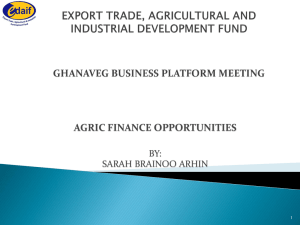EXPORT CONTROL REVIEW - Office of Research Integrity Assurance
advertisement
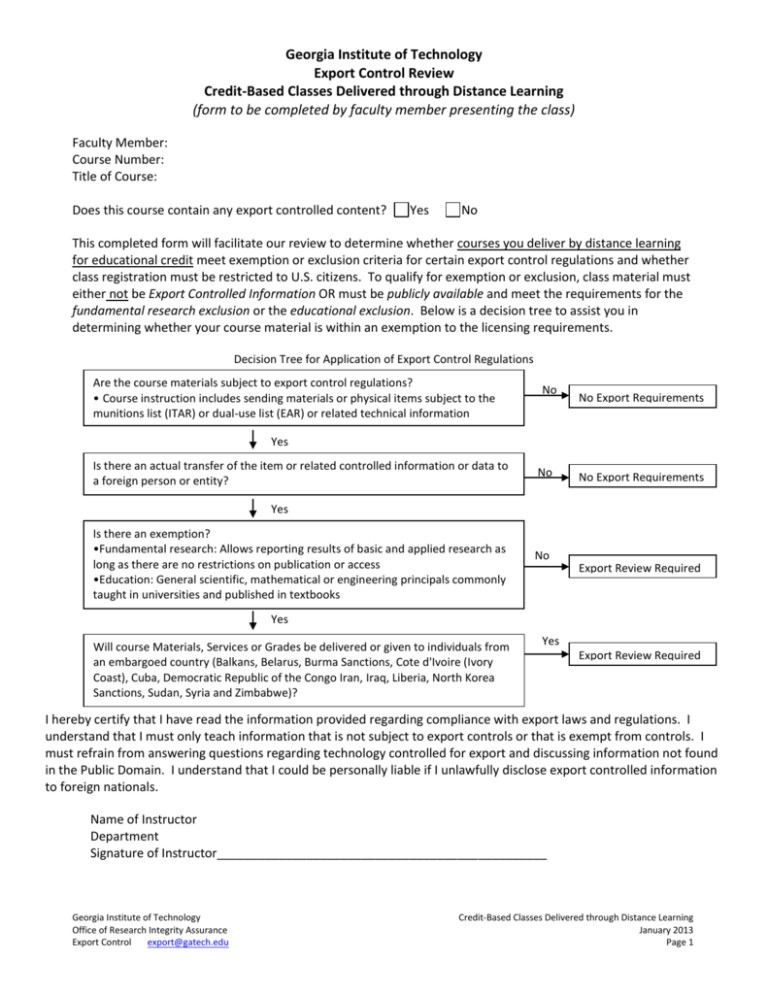
Georgia Institute of Technology Export Control Review Credit-Based Classes Delivered through Distance Learning (form to be completed by faculty member presenting the class) Faculty Member: Course Number: Title of Course: Does this course contain any export controlled content? Yes No This completed form will facilitate our review to determine whether courses you deliver by distance learning for educational credit meet exemption or exclusion criteria for certain export control regulations and whether class registration must be restricted to U.S. citizens. To qualify for exemption or exclusion, class material must either not be Export Controlled Information OR must be publicly available and meet the requirements for the fundamental research exclusion or the educational exclusion. Below is a decision tree to assist you in determining whether your course material is within an exemption to the licensing requirements. Decision Tree for Application of Export Control Regulations Are the course materials subject to export control regulations? • Course instruction includes sending materials or physical items subject to the munitions list (ITAR) or dual-use list (EAR) or related technical information No No Export Requirements Yes Is there an actual transfer of the item or related controlled information or data to a foreign person or entity? No No Export Requirements Yes Is there an exemption? •Fundamental research: Allows reporting results of basic and applied research as long as there are no restrictions on publication or access •Education: General scientific, mathematical or engineering principals commonly taught in universities and published in textbooks No Export Review Required Yes Will course Materials, Services or Grades be delivered or given to individuals from an embargoed country (Balkans, Belarus, Burma Sanctions, Cote d'Ivoire (Ivory Coast), Cuba, Democratic Republic of the Congo Iran, Iraq, Liberia, North Korea Sanctions, Sudan, Syria and Zimbabwe)? Yes Export Review Required I hereby certify that I have read the information provided regarding compliance with export laws and regulations. I understand that I must only teach information that is not subject to export controls or that is exempt from controls. I must refrain from answering questions regarding technology controlled for export and discussing information not found in the Public Domain. I understand that I could be personally liable if I unlawfully disclose export controlled information to foreign nationals. Name of Instructor Department Signature of Instructor________________________________________________ Georgia Institute of Technology Office of Research Integrity Assurance Export Control export@gatech.edu Credit-Based Classes Delivered through Distance Learning January 2013 Page 1 Resources Are Available to You The Office of Legal Affairs (asklegal@gatech.edu) and Office of Research Integrity Export Team (export@gatech.edu) may be contacted by email. A general overview of export regulations and some definitions are provided at the end of this document to facilitate your response. More detailed guidance is posted at www.export.gatech.edu. While you are not expected to be an authority on export control law, you should become reasonably familiar with the general obligations under export laws and regulations as they relate to your academic discipline and to teaching classes that are accessible globally. It is important to review course material to avoid an unlawful disclosure, orally or visually, by transferring export controlled information to foreign persons inside or outside the United States. A Foreign Person is a person who is not a U.S. citizen or permanent resident alien of the United States of America. General Definitions and Regulation Excerpts In general, Export Controlled Information means activities, technology and information related to the design, development, engineering, manufacture, production, assembly, testing, repair, maintenance, operation, modification, demilitarization, processing or use of items with military application. It does not include information which is basic marketing information on function or purpose, general system descriptions, or information concerning general scientific, mathematical or engineering principals commonly taught in schools, colleges and universities or information in the public domain. Possible penalties for unlawful export: Effective October 16, 2007, the International Emergency Economic Powers Enhancement Act (S. 1612) significantly increased the penalties for violations of U.S. export control and sanctions regulations. Civil penalties have risen to $250,000 per violation or twice the monetary amount of the underlying transaction, whichever is greater. Criminal penalties have been increased to an amount up to $1,000,000 per violation and provides for imprisonment of up to 20 years. The Act allows for the increased penalties to be applied retroactively to certain violations committed prior to enactment of the Act. Publicly available information that is not subject to export controls must be already published or will be published through: a) libraries open to the public, including most university libraries; b) unrestricted subscriptions, newsstands, or bookstores for a cost not exceeding reproduction and distribution costs (including a reasonable profit); c) published patents; d) conferences, meetings, seminars, trade shows or exhibits held anywhere (EAR), which are generally accessible by the public for a fee reasonably related to the cost and where attendees may take notes and leave with notes; or e) websites accessible to the public for free and without the host’s knowledge of or control of who visits or downloads software/information.. The fundamental research exclusion applies literally to (a) information (but not to export controlled items) (b) resulting from “basic and applied research in science and engineering” (c) conducted at an “accredited institution of higher education” (d) “located in the United States” (e) that is “ordinarily published and shared broadly within the scientific community” and (f) that is not “restricted for proprietary reasons or specific national security reasons.” Educational Exclusion: Whether in the U.S. or abroad, these exclusions cover teaching foreign nationals general science, math, and engineering commonly taught at schools, colleges and universities and conveying to foreign nationals information through courses listed in course catalogues and in associated teaching laboratories of academic institutions, even if the information concerns controlled items. The EAR exclusion does not cover controlled information conveyed outside of the classroom or teaching lab of an academic institution. Georgia Institute of Technology Office of Research Integrity Assurance Export Control export@gatech.edu Credit-Based Classes Delivered through Distance Learning January 2013 Page 2 Export Administration Regulations (EAR) Definitions: (A) Published Information and Software: Information is "published" when it becomes generally accessible to the interested public in any form, readily available at libraries open to the public or at university libraries, patents and open (published) patent applications, released at an open conference, meeting, seminar, trade show, or other open gathering. Software and information is published when it is available for general distribution either for free or at a price that does not exceed the cost of reproduction and distribution. Notwithstanding, encryption software with symmetric key length exceeding 64-bits will not be considered published for purposes of this definition. (B) Fundamental Research is defined as basic and applied research in science and engineering, where the resulting information is ordinarily published and shared broadly within the scientific community. Such research can be distinguished from proprietary research and from industrial development, design, production, and product utilization, the results of which ordinarily are restricted for proprietary reasons or specific national security reasons. (1) Research conducted by scientists, engineers, or students at a university normally will be considered fundamental research ("University" means any accredited institution of higher education located in the United States.) (2) Prepublication review by a sponsor of university research solely to insure that the publication would not inadvertently divulge proprietary information that the sponsor has furnished to the researchers does not change the status of the research as fundamental research. However, release of information from a corporate sponsor to university researchers where the research results are subject to prepublication review will require further export review. (3) Prepublication review by a sponsor of university research solely to ensure that publication would not compromise patent rights does not change the status of fundamental research, so long as the review causes no more than a temporary delay in publication of the research results. (C) EDUCATIONAL INFORMATION is that information which is released by instruction in catalog courses and associated teaching laboratories of academic institutions. Note that the provisions of this section do not apply to encryption software exceeding 64-bits. International Traffic in Arms (ITAR) Definitions: (A) PUBLIC DOMAIN means information which is published and which is generally accessible or available to the public; through sales at newsstands and bookstores, through subscriptions which are available without restriction to any individual who desires to obtain or purchase the published information, through second class mailing privileges granted by the U.S. Government, at libraries open to the public or from which the public can obtain documents, through patents available at any patent office, through unlimited distribution at a conference, meeting, seminar, trade show or exhibition, generally accessible to the public and in the United States, through public release (unlimited distribution) after approval by the cognizant U.S. Government department or agency, through fundamental research in science and engineering at accredited institutions of higher learning in the U.S. where the resulting information is ordinarily published and shared broadly in the scientific community. Fundamental research is defined to mean basic and applied research in science and engineering where the resulting information is published and shared broadly within the scientific community, as distinguished from research the results of which are restricted for proprietary reasons or specific U.S. Government access and dissemination controls. University research will not be considered fundamental research if; the University accepts other restrictions on publication of scientific or technical information resulting from the activity, or if the research is funded by the U.S. Government and specific access and dissemination controls protecting information resulting from the research are applicable. (B) DEFENSE ARTICLE means: any item or technical data designated in Section 121.1 of the ITAR (the U.S. Munitions List). The term includes technical data, recorded or stored in any physical form, models, mock-ups or other items that reveal technical data directly relating to items designated in Section 121.1. It does not include basic marketing information on function or purpose or general system descriptions. Georgia Institute of Technology Office of Research Integrity Assurance Export Control export@gatech.edu Credit-Based Classes Delivered through Distance Learning January 2013 Page 3 (C) DEFENSE SERVICE means: (1) The furnishing of assistance (including training) to foreign persons, whether in the United States or abroad in the design, development, engineering, manufacture, production, assembly, testing, repair, maintenance, modification, operation, demilitarization, destruction, processing or use of defense articles; (2) The furnishing to foreign persons of any technical data controlled under this subchapter (see Sec. 120.10), whether in the United States or abroad; or (3) Military training of foreign units and forces, regular and irregular, including formal or informal instruction of foreign persons in the United States or abroad or by correspondence courses, technical, educational, or information publications and media of all kinds, training aid, orientation, training exercise, and military advice. Website: www.export.gatech.edu Georgia Institute of Technology Office of Research Integrity Assurance Export Control export@gatech.edu Email: export@gatech.edu Credit-Based Classes Delivered through Distance Learning January 2013 Page 4

